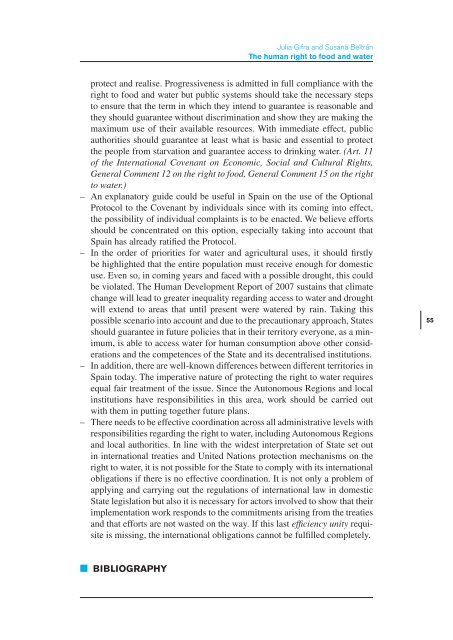Food security and global security - IEEE
Food security and global security - IEEE
Food security and global security - IEEE
- No tags were found...
You also want an ePaper? Increase the reach of your titles
YUMPU automatically turns print PDFs into web optimized ePapers that Google loves.
Julia Gifra <strong>and</strong> Susana BeltránThe human right to food <strong>and</strong> waterprotect <strong>and</strong> realise. Progressiveness is admitted in full compliance with theright to food <strong>and</strong> water but public systems should take the necessary stepsto ensure that the term in which they intend to guarantee is reasonable <strong>and</strong>they should guarantee without discrimination <strong>and</strong> show they are making themaximum use of their available resources. With immediate effect, publicauthorities should guarantee at least what is basic <strong>and</strong> essential to protectthe people from starvation <strong>and</strong> guarantee access to drinking water. (Art. 11of the International Covenant on Economic, Social <strong>and</strong> Cultural Rights,General Comment 12 on the right to food, General Comment 15 on the rightto water.)––An explanatory guide could be useful in Spain on the use of the OptionalProtocol to the Covenant by individuals since with its coming into effect,the possibility of individual complaints is to be enacted. We believe effortsshould be concentrated on this option, especially taking into account thatSpain has already ratified the Protocol.––In the order of priorities for water <strong>and</strong> agricultural uses, it should firstlybe highlighted that the entire population must receive enough for domesticuse. Even so, in coming years <strong>and</strong> faced with a possible drought, this couldbe violated. The Human Development Report of 2007 sustains that climatechange will lead to greater inequality regarding access to water <strong>and</strong> droughtwill extend to areas that until present were watered by rain. Taking thispossible scenario into account <strong>and</strong> due to the precautionary approach, Statesshould guarantee in future policies that in their territory everyone, as a minimum,is able to access water for human consumption above other considerations<strong>and</strong> the competences of the State <strong>and</strong> its decentralised institutions.––In addition, there are well-known differences between different territories inSpain today. The imperative nature of protecting the right to water requiresequal fair treatment of the issue. Since the Autonomous Regions <strong>and</strong> localinstitutions have responsibilities in this area, work should be carried outwith them in putting together future plans.––There needs to be effective coordination across all administrative levels withresponsibilities regarding the right to water, including Autonomous Regions<strong>and</strong> local authorities. In line with the widest interpretation of State set outin international treaties <strong>and</strong> United Nations protection mechanisms on theright to water, it is not possible for the State to comply with its internationalobligations if there is no effective coordination. It is not only a problem ofapplying <strong>and</strong> carrying out the regulations of international law in domesticState legislation but also it is necessary for actors involved to show that theirimplementation work responds to the commitments arising from the treaties<strong>and</strong> that efforts are not wasted on the way. If this last efficiency unity requisiteis missing, the international obligations cannot be fulfilled completely.55■■BIBLIOGRAPHY
















